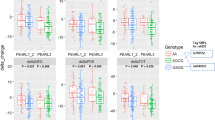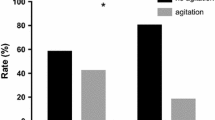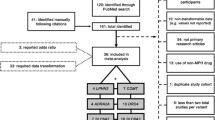Abstract
Adrenergic α2A receptor gene (ADRA2A) is one of the most promising candidate genes for ADHD pharmacogenetics. Thus far, three studies have investigated the association between the ADRA2A −1291 C>G polymorphism and the therapeutic response to methylphenidate (MPH) in children with ADHD, all of them with positive results. The aim of this study is to investigate, for the first time, the association between three ADRA2A polymorphisms (−1291 C>G, −262 G>A, and 1780 C>T) and the response to MPH in adults with ADHD. The sample comprises 165 Brazilians of European descent evaluated in the adult ADHD outpatient clinic of the Hospital de Clínicas de Porto Alegre. The diagnostic procedures followed the DSM-IV criteria. Drug response was assessed by both categorical and dimensional approaches, through the scales Swanson, Nolan, and Pelham Rating scale version IV and the Clinical Global Impression-Severity Scale, applied at the beginning and after the 30th day of treatment. We found no evidence of association between the three ADRA2A polymorphisms and the therapeutic response to MPH treatment. Our findings do not support a significant role for the ADRA2A gene in ADHD pharmacogenetics, at least among adult patients.
Similar content being viewed by others
References
American Psychiatric Association (1994) Diagnostic and statistical manual of mental disorders, 4th edn. American Psychiatric Association, Washington, DC
Arnsten AF, Dudley AG (2005) Methylphenidate improves prefrontal cortical cognitive function through alpha2 adrenoceptor and dopamine D1 receptor actions: Relevance to therapeutic effects in Attention Deficit Hyperactivity Disorder. Behav Brain Funct 1(1):2
Arnsten AF, Li BM (2005) Neurobiology of executive functions: catecholamine influences on prefrontal cortical functions. Biol Psychiatry 57(11):1377–1384
Arnsten AF (2009) Toward a new understanding of attention-deficit hyperactivity disorder pathophysiology: an important role for prefrontal cortex dysfunction. CNS Drugs 23(Suppl 1):33–41
Barkley RA (1990) Attention-Deficit Hyperactivity Disorder: A Handbook for Diagnosis and Treatment. Guilford Press, New York
Biederman J (2004) Impact of comorbidity in adults with attention-deficit/hyperactivity disorder. J Clin Psychiatry 65(Suppl 3):3–7
Biederman J, Faraone SV (2005) Attention-deficit hyperactivity disorder. Lancet 366(9481):237–248
Brown RT, Amler RW, Freeman WS et al (2005) Treatment of attention-deficit/hyperactivity disorder: overview of the evidence. Pediatrics 115(6):e749–e757
Charach A, Ickowicz A, Schachar R (2004) Stimulant treatment over five years: adherence, effectiveness, and adverse effects. J Am Acad Child Adolesc Psychiatry 43(5):559–567
Cheon KA, Cho DY, Koo MS et al (2009) Association between homozygosity of a G allele of the alpha-2a-adrenergic receptor gene and methylphenidate response in Korean children and adolescents with attention-deficit/hyperactivity disorder. Biol Psychiatry 65(7):564–570
Contini V, Victor MM, Marques FZ et al (2010) Response to methylphenidate is not influenced by DAT1 polymorphisms in a sample of Brazilian adult patients with ADHD. J Neural Transm 117(2):269–276
da Silva TL, Pianca TG, Roman T et al (2008) Adrenergic alpha2A receptor gene and response to methylphenidate in attention-deficit/hyperactivity disorder-predominantly inattentive type. J Neural Transm 115(2):341–345
de Cerqueira CCS, Polina ER, Contini V et al (2010) ADRA2A polymorphisms and ADHD in adults: possible mediating effect of personality. Psychiatry Res. doi:10.1016/j.psychres.2010.08.032
Faraone SV, Biederman J, Weber W et al (1998) Psychiatric, neuropsychological, and psychosocial features of DSM-IV subtypes of attention-deficit/hyperactivity disorder: results from a clinically referred sample. J Am Acad Child Adolesc Psychiatry 37(2):185–193
Faraone SV, Spencer T, Aleardi M et al (2004) Meta-analysis of the efficacy of methylphenidate for treating adult attention-deficit/hyperactivity disorder. J Clin Psychopharmacol 24(1):24–29
Fischer AG, Bau CHD, Grevet EH et al (2007) The role of comorbid major depressive disorder in the clinical presentation of adult ADHD. J Psychiatr Res 41:991–996
Froehlich TE, McGough JJ, Stein MA (2010) Progress and promise of attention-deficit hyperactivity disorder pharmacogenetics. CNS Drugs 24(2):99–117
Gaub M, Carlson CL (1997) Gender differences in ADHD: a meta-analysis and critical review. J Am Acad Child Adolesc Psychiatry 36(8):1036–1045
Gizer IR, Ficks C, Waldman ID (2009) Candidate gene studies of ADHD: a meta-analytic review. Hum Genet 126(1):51–90
Greenhill L, Beyer DH, Finkleson J et al (2002) Guidelines and algorithms for the use of methylphenidate in children with attention-deficit/hyperactivity disorder. J Atten Disord 6(Suppl 1):S89–100
Grevet EH, Bau CHD, Salgado CA et al (2005) Interrater reliability for diagnosis in adults of attention deficit hyperactivity disorder and oppositional defiant disorder using K-SADS-E. Arq Neuropsiquiatr 63:307–310
Grevet EH, Bau CHD, Salgado CA et al (2006) Lack of gender effects on subtype outcomes in adults with attention-deficit/hyperactivity disorder: support for the validity of subtypes. Eur Arch Psychiatry Clin Neurosci 256:311–319
Guy W (1976) ECDU Assessment manual for psychopharmacology, Revised. Bethesda, MD: US Department of Health, Education and Welfare
Heal DJ, Cheetham SC, Smith SL (2009) The neuropharmacology of ADHD drugs in vivo: insights on efficacy and safety. Neuropharmacology 57(7–8):608–618
Kalil KL, Bau CH, Grevet EH et al (2008) Smoking is associated with lower performance in WAIS-R Block Design scores in adults with ADHD. Nicotine Tob Res 10(4):683–688
Karam RG, Bau CH, Salgado CA et al (2009) Late-onset ADHD in adults: milder, but still dysfunctional. J Psychiatr Res 43(7):697–701
Kieling C, Genro JP, Hutz MH, Rohde LA (2010) A current update on ADHD pharmacogenomics. Pharmacogenomics 11(3):407–419
Kolar D, Keller A, Golfinopoulos M et al (2008) Treatment of adults with attention-deficit/hyperactivity disorder. Neuropsychiatr Dis Treat 4(1):107–121
Kooij JJ, Burger H, Boonstra AM et al (2004) Efficacy and safety of methylphenidate in 45 adults with attention-deficit/hyperactivity disorder. A randomized placebo-controlled double-blind cross-over trial. Psychol Med 34(6):973–982
Kurnik D, Muszkat M, Li C et al (2006) Variations in the alpha2A-adrenergic receptor gene and their functional effects. Clin Pharmacol Ther 79(3):173–185
Lahiri DK, Nurnberger JI Jr (1991) A rapid non-enzymatic method for the preparation of HMW DNA from blood for RFLP studies. Nucleic Acids Res 11:5444
Lario S, Calls J, Cases A et al (1997) MspI identifies a biallelic polymorphism in the promoter region of the alpha 2A-adrenergic receptor gene. Clin Genet 51(2):129–130
Lee HY, Kang RH, Paik JW et al (2009) Association of the adrenergic alpha 2a receptor–1291C/G polymorphism with weight change and treatment response to mirtazapine in patients with major depressive disorder. Brain Res 1262:1–6
Lima JJ, Feng H, Duckworth L et al (2007) Association analyses of adrenergic receptor polymorphisms with obesity and metabolic alterations. Metabolism 56(6):757–765
Long JC, Williams RC, Urbanek M (1995) An E-M algorithm and testing strategy for multiple locus haplotypes. Am J Hum Genet 56:799–810
Long JC (1999) Multiple locus haplotype analysis, version 3.0. Software and documentation distributed by the author. Department of Human Genetics, University of Michigan Medical School, 4909 Buhl Bldg., Ann Arbor, MI 4819-0618
Maldonado G, Greenland S (1993) Simulation study of confounder-selection strategies. Am J Epidemiol 138(11):923–936
Mick E, Neale B, Middleton FA et al (2008) Genome-wide association study of response to methylphenidate in 187 children with attention-deficit/hyperactivity disorder. Am J Med Genet B Neuropsychiatr Genet 147B(8):1412–1418
Murphy K, Barkley RA (1996) Attention deficit hyperactivity disorder adults: comorbidities and adaptive impairments. Compr Psychiatry 37(6):393–401
Park YC, Chung SH, Lee KJ et al (2006) Weight gain associated with the alpha2a-adrenergic receptor-1, 291 C/G polymorphism and olanzapine treatment. Am J Med Genet B Neuropsychiatr Genet 141:394–397
Park L, Nigg JT, Waldman ID et al (2005) Association and linkage of alpha-2A adrenergic receptor gene polymorphisms with childhood ADHD. Mol Psychiatry 10(6):572–580
Polanczyk G, de Lima MS, Horta BL et al (2007) The worldwide prevalence of ADHD: a systematic review and metaregression analysis. Am J Psychiatry 164(6):942–948
Polanczyk G, Zeni C, Genro JP et al (2007) Association of the adrenergic alpha2A receptor gene with methylphenidate improvement of inattentive symptoms in children and adolescents with attention-deficit/hyperactivity disorder. Arch Gen Psychiatry 64(2):218–224
Prestes AP, Marques FZ, Hutz MH et al (2007) Tobacco smoking and the ADRA2A C-1291G polymorphism. J Neural Transm 114(11):1503–1506
Prince J (2008) Catecholamine dysfunction in attention-deficit/hyperactivity disorder: an update. J Clin Psychopharmacol 28(3 Suppl 2):S39–S45
Roman T, Polanczyk GV, Zeni C et al (2006) Further evidence of the involvement of alpha-2A-adrenergic receptor gene (ADRA2A) in inattentive dimensional scores of attention-deficit/hyperactivity disorder. Mol Psychiatry 11(1):8–10
Roman T, Schmitz M, Polanczyk GV et al (2003) Is the alpha-2A adrenergic receptor gene (ADRA2A) associated with attention-deficit/hyperactivity disorder? Am J Med Genet B Neuropsychiatr Genet 120(1):116–120
Rösler M, Fischer R, Ammer R et al (2009) A randomised, placebo-controlled, 24-week, study of low-dose extended-release methylphenidate in adults with attention-deficit/hyperactivity disorder. Eur Arch Psychiatry Clin Neurosci 259(2):120–129
Schmitz M, Denardin D, Silva TL et al (2006) Association between alpha-2a-adrenergic receptor gene and ADHD inattentive type. Biol Psychiatry 60(10):1028–1033
Simon V, Czobor P, Bálint S et al (2009) Prevalence and correlates of adult attention-deficit hyperactivity disorder: meta-analysis. Br J Psychiatry 194(3):204–211
Spencer T, Biederman J, Wilens T et al (2005) A large, double-blind, randomized clinical trial of methylphenidate in the treatment of adults with attention-deficit/hyperactivity disorder. Biol Psychiatry 57(5):456–463
Spencer J, Biederman T, Wilens M et al (1996) Pharmacotherapy of attention deficit hyperactivity disorder across the lifespan. J Am Acad Child Adolesc Psychiatry 35:409–428
Staddon S, Arranz MJ, Mancama D et al (2002) Clinical applications of pharmacogenetics in psychiatry. Psychopharmacology 162(1):18–23
Swanson JM (1992) School-based assessments and interventions for ADD students. KC Publishing, Irvine
Tamam L, Karakus G, Ozpoyraz N (2008) Comorbidity of adult attention-deficit hyperactivity disorder and bipolar disorder: prevalence and clinical correlates. Eur Arch Psychiatry Clin Neurosci 258(7):385–393
Victor MM, Grevet EH, Salgado CA et al (2009) Reasons for pretreatment attrition and dropout from methylphenidate in adults with attention-deficit/hyperactivity disorder: the role of comorbidities. J Clin Psychopharmacol 29(6):614–616
Wakeno M, Kato M, Okugawa G et al (2008) The alpha 2A-adrenergic receptor gene polymorphism modifies antidepressant responses to milnacipran. J Clin Psychopharmacol 28(5):518–524
Wechsler D (1981) WAIS-R—manual for the wechsler adult intelligence scale—revised. The Psychological Corporation, San Antonio, Texas
Wilens TE (2008) Effects of methylphenidate on the catecholaminergic system in attention-deficit/hyperactivity disorder. J Clin Psychopharmacol 28(3 Suppl 2):S46–S53
Acknowledgments
Thanks are due to Felipe A. Picon, Paula O. G. da Silva, Katiane Silva, Nyvia O. Sousa and Rafael S. Giordani for help in the sample collection of ADHD patients and to Francine Z. Marques for part of the laboratory analysis. Conselho Nacional de Desenvolvimento Científico e Tecnológico (CNPq, Brazil), Instituto do Milênio (CNPq), FIPE-HCPA, Fundação de Amparo a Pesquisa do Estado do Rio Grande do Sul (FAPERGS), DECIT/SCTIE/MS/PPSUS and PRONEX funded this study.
Conflicts of interest
The ADHD Program received educational and research support from the following pharmaceutical companies in the last 3 years: Abbott, Bristol-Myers Squibb, Eli-Lilly, Janssen-Cilag, and Novartis. Dr Belmonte-de-Abreu is on the speaker’s bureau or is a consultant for Janssen-Cilag and Bristol-Myers Squibb. Dr Grevet is on the speaker’s bureau or is a consultant for Novartis and Janssen-Cilag.
Author information
Authors and Affiliations
Corresponding author
Rights and permissions
About this article
Cite this article
Contini, V., Victor, M.M., Cerqueira, C.C.S. et al. Adrenergic α2A receptor gene is not associated with methylphenidate response in adults with ADHD. Eur Arch Psychiatry Clin Neurosci 261, 205–211 (2011). https://doi.org/10.1007/s00406-010-0172-4
Received:
Accepted:
Published:
Issue Date:
DOI: https://doi.org/10.1007/s00406-010-0172-4




